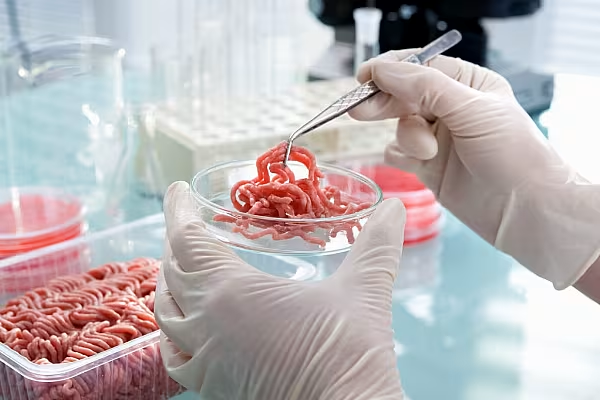More than £2.6 billion (€3 billion) has been invested in the cell-based meat segment since 2016, according to new estimates from corporate finance house Oghma Partners.
The global cell-based meat start-up category experienced exponential growth, starting from its initial emergence in the late 2010s.
Between 2016 and 2019, a total of £144.4 million (€165.5 million) was invested across 50 companies through 90 deals, data showed.
During the years 2020 and 2021, total investment in the segment grew to £1.8 billion (€2.1 billion), involving 86 companies and 159 deals.
Data also showed that a handful of companies have scooped up the lion's share of the funding, with Upside Foods alone raising £555.1 million (€636.3 million) - or more than a fifth (21.5%) of the global total.
In all, the top five cell-based meat manufacturers (Upside Foods, Believer Meats, Wildtype, Aleph Farms, and Mosa Meat) accounted for 46.9% of all funds raised between 2016-2023.
Mark Lynch, partner at Oghma Partners, stated, "A key driver of the rationale behind cell-based protein production is to generate cheap, low-carbon protein without the need for antibiotics and in a safe and controlled environment.
"Cell-based agriculture has, therefore, substantial potential as an alternative to traditional agriculture. We believe that this potential has driven interest and speculative investment into the industry."
Other Findings
Around 68% of deals are directed toward companies whose activity includes the development and production of cell-based meat, while the remaining are spread across cell-based seafood (17%), ingredients (11%), and pet food (4%).
Presently, the sale of cell-based meats is regulated and approved only in Singapore and the USA, with Upside Foods and Eat Just's 'Good Meat' having acquired regulatory approval.
In many other countries, regulatory progress looks promising with governments showing interest and support for cell-based meats.
However, not all nations view cell-based meats favourably. The Italian government recently moved to ban any cell-based meat activity within Italy.
Lynch added, "Significant investment into the cell-based meat industry has led to increasing cap-ex spending with many companies scaling up production capacity and R&D facilities. These investments, some of which are yet to be completed, have the potential to accelerate the launch of products to consumers in the cell-based meat space.
"However, money for new investment is now harder to come by, as the slowdown in funding so far in 2023 demonstrates. The industry will be challenged to deliver sales to consumers and to stretch funding runways to the point of delivering profitability. We see a shake-out similar to that we are seeing in the plant-based meat sector, with consolidation amongst the players most likely."














